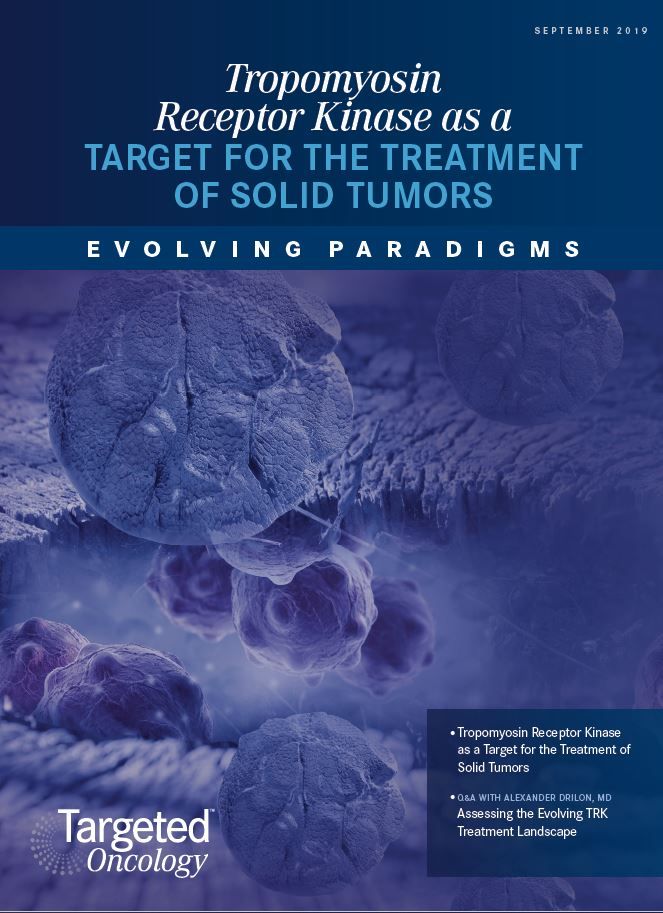Q&A With Alexander Drilon, MD: Assessing the Evolving TRK Treatment Landscape
Alexander Drilon, MD, speaks to the significance of <em>TRK </em>gene fusions and treatments for targeting these fusions in patients with cancer.
Alexander Drilon, MD

Alexander Drilon, MD
Given the rapidly evolving tyrosine kinase inhibitor (TKI) landscape, can you reflect on the significance of tropomyosin receptor kinase (TRK) gene fusions? Specifically, how will they continue to shape the treatment spectrum?
DRILON:TRKfusions are found across many different cancers, both select rare tumors where these are found at high frequencies and more common tumors where these are found at lower frequencies. While we’ve known about the TRK pathway for a few decades now, only in the last few years [have we] demonstrated thatTRKfusions are highly actionable in the clinic. The 2 first-generation agents that explored this activity are larotrectinib and entrectinib. Both achieve high response rates and durable disease control across various cancers. As such, these drugs are approved in a tumor-agnostic fashion for the treatment of these fusions in both the United States and Japan.
Can you discuss the broader trajectory and growing prominence of TKIs within the cancer treatment landscape?
DRILON:The main contribution of TRK TKI therapy forTRKfusionpositive cancers is that it resulted in the first approval of a targeted therapy for any cancer type [for] patients of any age as long as their tumors harbor aTRK[gene] fusion. This represented a landmark approval in the targeted therapy space that echoed the approval of pembrolizumab for microsatellite instabilityhigh cancers of any type. The hope is that we continue to see more drugs approved in this fashion moving forward.
What are some of the most significant differences among first-, second-, and third-generation TKIs?
DRILON:TRK TKIs fall into 2 major groups. As mentioned, larotrectinib and entrectinib are first-generation agents that were developed to target TRK. Larotrectinib is a selective TRK inhibitor, while entrectinib is a multikinase inhibitor that has activity against ROS1 and ALK in addition to TRK. Beyond these drugs, next-generation TKIs have been developed. These TKIs are not only more potent against TRK, but also address resistance mechanisms such as selectNTRK[neurotrophic receptor tyrosine kinase] mutations that can be acquired after progression on first-generation therapy. The 2 most prominent next-generation TKIs that are already being explored in the clinic on early-phase trials are LOXO-195 and repotrectinib.
Given the number of agents available, what are some factors that affect clinical treatment decisions?
DRILON:This would depend on which TRK inhibitors are available to physicians either on or off trial. Both larotrectinib and entrectinib achieve substantial benefit in patients, and both have shown activity against various fusions, cancer types, and age groups. Central nervous system activity has also been reported for both agents. Thus, in TKI-naïve patients, both drugs are reasonable treatment options. For patients [who] develop NTRK mutationmediated resistance, particularly those [who] develop solvent-front or gatekeeper mutations, LOXO-195 and repotrectinib should be considered. Both drugs have been shown to reestablish disease control in patients whose cancers develop these mutations after treatment with larotrectinib or entrectinib.
Can you share important takeaways regarding notable TKIs that are still in development and how they may advance the treatment armamentarium? How do you expect the TKI drug class to continue evolving over the next several years?
DRILON:In EGFR-mutant and ALK fusionpositive lung cancers, we’ve seen next-generation agents, such as osimertinib and alectinib, replace first-generation agents, such as erlotinib, with gefitinib and crizotinib. It remains unclear if next-generation TKI therapy will achieve better outcomes when used in the TKI-naïve setting forTRKfusionpositive cancers. At least repotrectinib is currently being explored in TKI-naïve patients, and data from that trial may give us a preliminary answer to this question. A next-generation agent, such as repotrectinib or LOXO-195 [BAY2731954], would need to achieve substantially longer disease control and comparable or improved safety relative to first-generation agents in order to be considered as the preferred approach in the treatment-naïve setting.
Could you share your perspective on the research pipeline regardingTRKgene fusions? Specifically, what challenges and opportunities remain regarding the identification of actionable mutations and the agents in development that can effectively target them?
DRILON:An unmet need in theTRKfusion space is the development of strategies to address off-target resistance. Some cancers will develop acquired resistance to a TRK inhibitor that is mediated by the activation of bypass pathways, such as MET, or [of] the RAS-RAF-MAPK pathway. Some of these alterations, such as MET amplification, could be addressed with combination therapy. There [are] early data to show that combination therapy (ie, a TRK inhibitor + MET inhibitor) can reestablish disease control inNTRK-fused and MET-amplified preclinical models and in the clinic. Should the frequency of one of these resistance alterations be reasonably high, a dedicated trial could be considered to explore the utility of combination therapy. Addressing off-target resistance requires careful resequencing of a patient’s cancer via a repeat biopsy or plasma cell-free DNA. The challenge with this is that, while useful, molecular profiling at resistance is not yet a standard of care, although ongoing trials have addressed this need by including coverage for repeat testing on a research basis.
